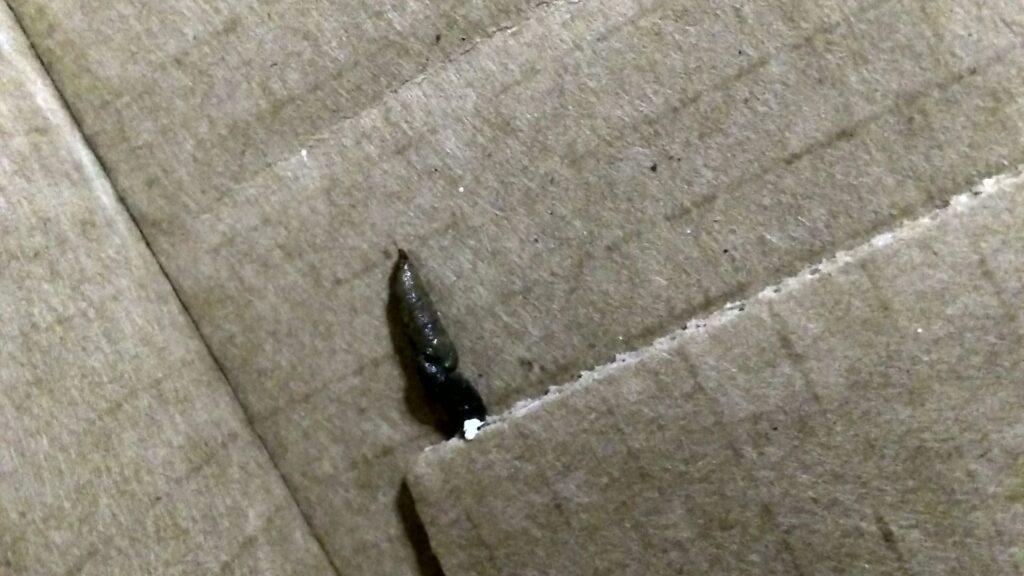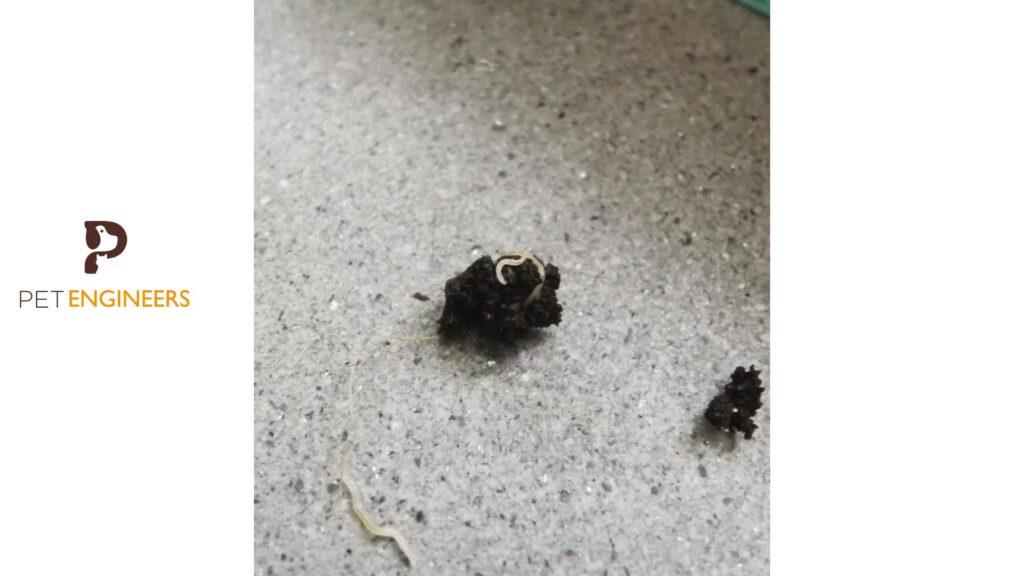
Key Takeaway:
- Normal crested gecko poop consists of brown or black solid feces and clear or slightly opaque liquid feces, and should be relatively firm and well-formed.
- Changes in consistency or color may indicate a health issue.
Crested geckos are fascinating pets, but their waste can sometimes be a cause of concern for new owners.
Understanding your crested gecko’s poop is an important aspect of providing proper care for your pet.
In this article, we will delve into all the important information you need to know about your crested gecko’s poop, including what it should look like, how often they should be pooping, and what to do if you notice any changes in their bathroom habits.
How Do Crested Geckos Poop?
Crested geckos, like all reptiles, excrete waste through their rectum and anus. When a crested gecko poops, they produce a small, cylindrical dropping that consists of both solid and liquid feces.
The solid feces is usually brown or black in color, while the liquid component may be clear or slightly opaque.
Crested geckos typically produce a single dropping at a time, which may be deposited on the floor of their enclosure or on a branch or other surface.
It’s important to regularly clean up your crested gecko’s poop to maintain a clean and healthy environment for your pet.
What Is Crested Gecko Poop Supposed To Look Like?
Normal crested gecko poop consists of two parts: a solid component, which is brown or black in color, and a clear or slightly opaque liquid component.
The solid feces is usually cylindrical in shape, while the liquid component may be a little more diffuse.

A healthy crested gecko should produce poop that is relatively firm and well-formed, without any signs of abnormal consistency or unusual coloration.
If you notice any changes in the appearance of your crested gecko’s poop, such as abnormal texture, color, or frequency, it may be a sign of an underlying health issue and you should consult with a veterinarian.
What Does Baby Crested Gecko Poop Look Like?
Baby crested gecko poop is similar in appearance to adult crested gecko poop, but it may be smaller in size.
It will consist of a solid component, which is usually brown or black in color, and a clear or slightly opaque liquid component.
The solid feces will be cylindrical in shape, and the liquid component will be a little more diffuse.
Like with adult crested geckos, it’s important to keep a close eye on baby crested gecko poop for any signs of abnormal consistency or coloration, as these may indicate an underlying health issue.
If you notice any changes in your baby crested gecko’s bathroom habits, it’s best to consult with a veterinarian.
How Often Does A Crested Gecko Poop?
The frequency of a crested gecko’s poop can vary, but they typically poop once or twice a day when they are less than a month old, and as they grow, this frequency drops to once every 2 or 3 days.
This frequency can be influenced by factors such as diet, age, stress levels, and overall health.
A healthy crested gecko that is fed a balanced diet and is kept in a suitable environment should produce a consistent and regular pattern of poop.
Crested Gecko Not Pooping
If your crested gecko is not pooping, it could be a sign of a health issue and should be evaluated by a veterinarian.
Constipation can be caused by a variety of factors, including dehydration, improper diet, and intestinal blockages.
Other potential causes of not pooping include stress, infection, or disease.

There could be several reasons why your crested gecko is not pooping, including:
Dehydration
If your crested gecko is not drinking enough water, it may become dehydrated, which can cause constipation.
Improper diet
A diet that is lacking in fiber or moisture can also cause constipation.
Stress
Stress can also affect a crested gecko’s digestive system and lead to not pooping.
Intestinal blockages
Foreign objects or impacted feces can cause blockages in the intestine, preventing the crested gecko from pooping.
Disease or infection
Certain diseases or infections can affect a crested gecko’s digestive system, leading to not pooping.
It’s important to provide your crested gecko with fresh, clean water and a balanced diet that includes both insects and fruits or vegetables
Additionally, you should maintain a suitable habitat that includes a warm and humid environment, with plenty of hiding places and climbing surfaces.
If your crested gecko is still not pooping, it’s important to seek veterinary care as soon as possible to rule out any underlying health issues.
How Long Can A Crested Gecko Go Without Pooping?
A crested gecko can go for several days without pooping, but if it goes for a week or more without producing any poop, it’s a cause for concern and a sign of a potential health issue.
Crested geckos that are not pooping for an extended period of time may be suffering from dehydration, constipation, or an underlying health issue.
In some cases, not pooping can also indicate a blockage in the intestine, which can be serious and may require veterinary intervention.
Why Is My Crested Gecko’s Poop Runny?
If your crested gecko’s poop is runny, it could indicate a number of different health issues, including:
Dehydration
If your crested gecko is dehydrated, their poop will be more liquid in consistency.
Improper diet
A diet that is lacking in fiber or that is high in water content can also lead to runny poop.
Stress
Stress can also affect a crested gecko’s digestive system and lead to runny poop.
Infection
Certain infections, such as parasites or bacterial infections, can also lead to runny poop.
Worms In Crested Gecko Poop

The presence of worms in a crested gecko’s poop is a sign of a parasite infestation and should be taken seriously.
Parasites can interfere with a crested gecko’s digestive system and cause a variety of health issues, including weight loss, diarrhea, and decreased appetite.
Common types of parasites that can infect crested geckos include pinworms, roundworms, and tapeworms.
These parasites can be transmitted through contaminated food, water, or the environment.
If you suspect that your crested gecko has a parasite infestation, it’s important to seek veterinary care as soon as possible.
Your vet will be able to diagnose the issue and recommend an appropriate course of treatment, which may include medication and changes to your pet’s diet and habitat.
By promptly treating any parasite infestations, you can help ensure the continued health and well-being of your pet.
Crested Gecko Poop Smell
Crested gecko poop should not have a strong or unpleasant odor.
A slight, earthy, or musty odor is normal, but if the smell is strong, pungent, or accompanied by other symptoms such as runny or discolored poop, it may indicate a health issue, such as an infection or digestive problem.
In order to minimize the odor of your crested gecko’s poop, it’s important to keep their cage clean and to spot-clean any soiled areas on a regular basis.
You can also use a substrate that helps control odors, such as coconut coir or sphagnum moss.

If the odor of your crested gecko’s poop is concerning, or if you notice any changes in their bathroom habits, it’s important to seek veterinary care as soon as possible to rule out any underlying health issues.
By promptly addressing any issues related to your crested gecko’s poop, you can help ensure their continued health and well-being.
What Color Should Gecko Poop Be?
Crested gecko poop should be brown to dark brown in color and is usually composed of feces and urates, which are white or light yellow in color.
The exact shade of brown may vary depending on their diet and hydration levels, but it should be relatively consistent from day to day.
If the color of your crested gecko’s poop changes suddenly or if it is discolored, this can indicate a health issue.
For example, green poop can indicate a bacterial infection, while black or very dark brown poop may indicate internal bleeding.
If you notice any changes in the color or consistency of your crested gecko’s poop, it’s important to seek veterinary care as soon as possible to rule out any underlying health issues.
Meaning Of Different Colors Of Crested Gecko Poop
The color of crested gecko poop can offer valuable insight into their health and diet. The following are some common colors of crested gecko poop and what they may indicate:
Brown to dark brown
This is the normal color for crested gecko poop and is a sign of a healthy digestive system.
Green
Green poop can indicate a bacterial infection or a diet that is too high in fruits and vegetables.
Black or very dark brown
Black or very dark brown poop may indicate internal bleeding or a diet that is too high in insects.
Red or pink
The presence of red or pink in the poop can indicate the presence of fresh blood and should be taken seriously as it could indicate a serious health issue.
White
White or light-yellow urates are normal in crested gecko poop.
However, if the urates are chalky or excessively large, this can indicate a mineral imbalance or dehydration.
Crested Gecko Poops On Me
If your crested gecko is pooping on you, it could be a sign of a few different things.
One possibility is that they are simply marking their territory and letting you know that you are in their space.
Another possibility is that they are feeling stressed or scared, which can cause them to release waste.
To help prevent your crested gecko from pooping on you in the future, it’s important to handle them gently and avoid sudden movements that could startle them.
You can also try to acclimate them to being handled gradually by offering them treats and spending time near them before attempting to pick them up.
It’s also important to keep in mind that crested geckos are naturally arboreal and may feel more comfortable when they are up high.
If you have the space, you can provide them with a climbing structure, such as a tall branch or a climbing wall, which they can use to explore and feel secure.
If the problem persists, it may be helpful to seek advice from a reptile veterinarian or a reptile specialist, who can help you understand your pet’s behavior and develop a plan to address the issue.
Cresting Gecko Pooping Blood: Causes And Solutions
Blood in a crested gecko’s poop is a serious issue that can indicate a health problem. The following are some common causes of blood in crested gecko poop:
Parasites

Parasites, such as mites, ticks, or intestinal worms, can cause irritation and inflammation in the digestive tract, leading to the presence of blood in the poop.
Solution: Treat with veterinary-prescribed dewormer or parasite control medication. Improve hygiene and cleanliness in the gecko’s environment.
Diet
A diet that is high in fat, protein, or calcium can cause digestive tract irritation and lead to the presence of blood in the poop.
Solution: Offer a balanced and varied diet that is appropriate for crested geckos. Consult your vet and check what nutrients need to be
Impactions
Impactions, or blockages in the digestive tract, can cause irritation and lead to the presence of blood in the poop.
Solution: Offer a balanced diet with appropriate levels of hydration. Offer a soaking bath to help alleviate the impaction. Seek veterinary care if necessary.
Injuries
Injuries to the digestive tract, such as abrasions or cuts, can cause bleeding and lead to the presence of blood in the poop.
Clean and treat any visible wounds. Provide a clean and safe environment to prevent further injury. Seek veterinary care if necessary.
Tumors or other health issues
Tumors or other underlying health issues can also cause bleeding in the digestive tract and lead to the presence of blood in the poop.
Solution: Seek veterinary care for a proper diagnosis and treatment plan. Provide a balanced diet and proper husbandry to support overall health.
Summary
The appearance and frequency of a crested gecko’s poop can provide important information about their health and well-being.
Normal crested gecko poop should consist of a solid component that is brown or black in color and a clear or slightly opaque liquid component.
A healthy crested gecko should produce a consistent and regular pattern of poop, typically once every 2 or 3 days.
If you notice any changes in your crested gecko’s bathroom habits, such as not pooping or runny poop, it may be a sign of an underlying health issue and it’s best to consult with a veterinarian.
By providing your crested gecko with a balanced diet, suitable habitat, and proper care, you can ensure that they remain healthy and happy.

